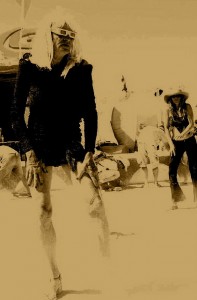
Radical Inclusion, –noun, Radical Inclusion is the idea that everyone is welcome at That Thing In the Desert and other events which follow the Ten Principles of Burning Man. Though many have commented on the predominantly Caucasian make-up of the Black Rock City population, citizenship is open to all.
This is not limited to just the usual race, creed, color or sexual orientation. Many find a home at Burn events who feel themselves outcasts in the default world for countless reasons. Even more so, participants feel free to remove the masks they wear in polite society and share their freakiest, most delightfully deviant selves.
But what are the limits of radical inclusion? Some extreme behaviors, like theft and assault, must be held unacceptable in any healthy community. And just because an event is attended by Burners does not mean it will allow everyone — this is especially true of parties in private homes. This is not discrimination, but the natural formation of social groups and friend circles. However, this principle still serves to discourage cliquish behavior and encourage the introduction of new blood to older groups.
Like all of the Burner Principles, radical inclusion functions poorly in isolation and works best when used in conjunction with the other nine and a healthy dose of common sense.
The Lexicographer has been soliciting the opinion of other thoughtful Burners on the Ten Principles. Below you will find the opinions of several, but more are still welcomed. Use the contact information at the top to submit your thoughts.
Other entries in A Burner Lexicon can be found at https://kitoconnell.com/lexicon/
Anonymous is a long-time member of the Burn community and a friend of the lexicographer. Anonymous wrote this on Radical Inclusion:
The Burning Man web site reads:
“Radical Inclusion:
Anyone may be a part of Burning Man. We welcome and respect the stranger. No prerequisites exist for participation in our community.”
While this seems to be an attempt to counter the various forms of race/gender/sexuality/etc. discrimination rampant in American culture, this idealistic, overly permissive statement opens the door to harmful persons such as known criminals. Too often it has been interpreted that communities and events must be necessarily all-inclusive to the exclusion of common sense, basic accountability, and healthy protective boundaries.
When someone enters a space or community as a stranger, it is fair to give him or her a chance to express himself or herself without arbitrary prejudgment. Once someone commits harmful actions against others, he or she is no longer a stranger; he or she is a known problem that should no longer be welcomed. No individual or community should be encouraged to tolerate harmful or criminal behavior from anyone. Keep your wits about you, consider all the information you have, and go with your gut when deciding whom to trust.
Ranger Beauty, a burner for over a decade and a 10-year member of the Rangers, wrote:
Radical Inclusion – the idea that everyone is equally welcome at Burn events, no matter how weird.
Unless you tried to (and allegedly did) burn the man down.
Will is a newer member of the Texas burn community and a volunteer writer in my Web Content Team. In a comment on a previous lexicon entry, he wrote in part:
If you want some thorny and difficult questions to chew on regarding Radical Inclusion, check out the Wikipedia pages on “Temporary Autonomous Zone” and “Hakim Bey,” and then Robert P. Helms’ very well cited article, “Leaving out the ugly part.” Helms airs some grievances that I consider trivial, such as the ones about Bey being against abortion and Bey’s use of Latin, but he also makes a very solid case that Bey, besides being a philosophical godfather of Burning Man, is a pedophile attracted to boys who are barely pubescent or even pre pubescent. Should Bey or similar people be banned from Burning Man? Should the adults of Burning Man exclude anyone under 18 in the first place, since Black Rock City does tend to have a lot of public sex and drugs around, and the legal liability and ethical gray areas are indeed pretty darn threatening? Should Black Rock City be like any other city, and expected to include both kids and a few pedophile adults, and use normal “reality camp” mechanisms like parental supervision to avoid trouble? Plenty of fodder for angry arguments in all three of those questions.